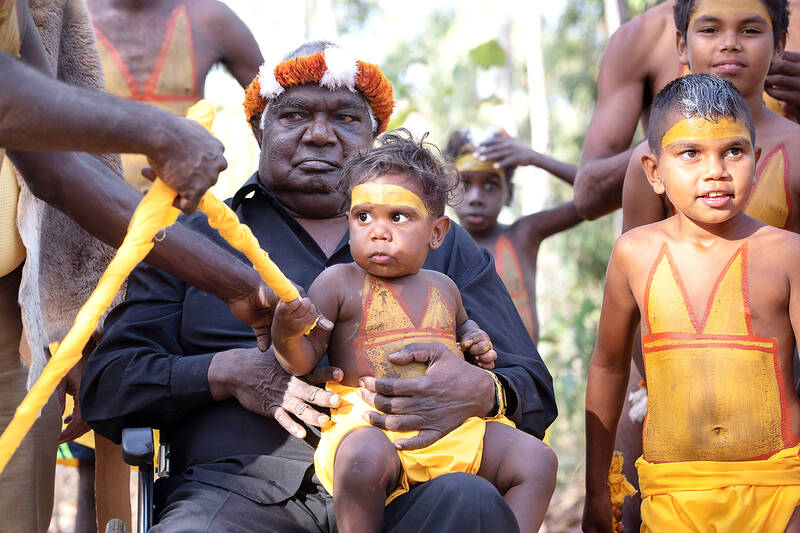One of Australia’s most important Aboriginal leaders, Yunupingu, yesterday died aged 74, with supporters describing the indigenous rights trailblazer as a “giant of the nation.”
Yunupingu played a pivotal role in Aboriginal Australians’ fight for ancestral land rights throughout the 1960s and 1970s.
He was recognized as a “national living treasure” in 1998.

Photo: REUTERS
He is known for the decades he spent advocating for Aboriginal Australians to be recognized in the country’s constitution — an issue that is to be decided through a national referendum at the end of this year.
Australian Prime Minister Anthony Albanese called Yunupingu — whose family asked that his given name not be used after his death, in keeping with Aboriginal tradition — “one of the greatest Australians.”
“Yunupingu walked in two worlds with authority, power and grace, and he worked to make them whole together,” Albanese said.
“With his passing, consider what we have lost. A leader. A statesman,” he said.
Yunupingu, who died after a long illness, was part of the Yolngu people from Arnhem Land in northern Australia — a remote region spanning tropical coastlines and sprawling inland savannas.
In the early 1960s, he helped draft the Yirrkala bark petitions, in which the Yolngu people sought to stave off foreign mining projects by asserting their ownership of the land.
The petitions, framed by traditional bark paintings, would inspire a generation of Aboriginal land rights activists across the country.
“Yunupingu was a master of the ceremonies and a keeper of the songlines of the Yolngu people,” the Yothu Yindi Foundation said.
“A giant of the nation whose contribution to public life spanned seven decades, he was first and foremost a leader of his people, whose welfare was his most pressing concern and responsibility,” it said.
Indigenous Australians settled in the country about 65,000 years ago.
They have suffered widespread discrimination and oppression since the arrival of the British more than two centuries ago.

Brazil, the world’s largest Roman Catholic country, saw its Catholic population decline further in 2022, while evangelical Christians and those with no religion continued to rise, census data released on Friday by the Brazilian Institute of Geography and Statistics (IBGE) showed. The census indicated that Brazil had 100.2 million Roman Catholics in 2022, accounting for 56.7 percent of the population, down from 65.1 percent or 105.4 million recorded in the 2010 census. Meanwhile, the share of evangelical Christians rose to 26.9 percent last year, up from 21.6 percent in 2010, adding 12 million followers to reach 47.4 million — the highest figure

A Chinese scientist was arrested while arriving in the US at Detroit airport, the second case in days involving the alleged smuggling of biological material, authorities said on Monday. The scientist is accused of shipping biological material months ago to staff at a laboratory at the University of Michigan. The FBI, in a court filing, described it as material related to certain worms and requires a government permit. “The guidelines for importing biological materials into the US for research purposes are stringent, but clear, and actions like this undermine the legitimate work of other visiting scholars,” said John Nowak, who leads field

‘THE RED LINE’: Colombian President Gustavo Petro promised a thorough probe into the attack on the senator, who had announced his presidential bid in March Colombian Senator Miguel Uribe Turbay, a possible candidate in the country’s presidential election next year, was shot and wounded at a campaign rally in Bogota on Saturday, authorities said. His conservative Democratic Center party released a statement calling it “an unacceptable act of violence.” The attack took place in a park in the Fontibon neighborhood when armed assailants shot him from behind, said the right-wing Democratic Center, which was the party of former Colombian president Alvaro Uribe. The men are not related. Images circulating on social media showed Uribe Turbay, 39, covered in blood being held by several people. The Santa Fe Foundation

NUCLEAR WARNING: Elites are carelessly fomenting fear and tensions between nuclear powers, perhaps because they have access to shelters, Tulsi Gabbard said After a trip to Hiroshima, US Director of National Intelligence Tulsi Gabbard on Tuesday warned that “warmongers” were pushing the world to the brink of nuclear war. Gabbard did not specify her concerns. Gabbard posted on social media a video of grisly footage from the world’s first nuclear attack and of her staring reflectively at the Hiroshima Peace Memorial. On Aug. 6, 1945, the US obliterated Hiroshima, killing 140,000 people in the explosion and by the end of the year from the uranium bomb’s effects. Three days later, a US plane dropped a plutonium bomb on Nagasaki, leaving abut 74,000 people dead by the